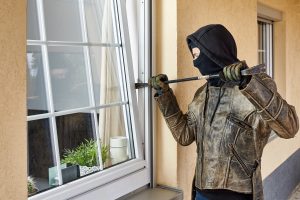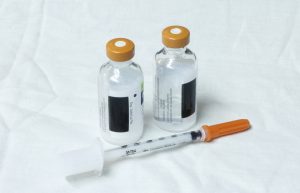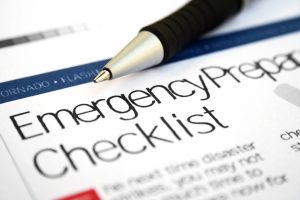Part 5 of 5
9 months later….
You are sitting at your desk, sipping your second cup of coffee. “Feels good to be back’” you think to yourself. It’s a slow day at work. Slower than usual. Since the bioterror event your hours have been cut. You have been back to work for almost 8 months, and now come into work only 3 days a week. Overall, however, you are very grateful you still have a job. Working IT security has proven to be a recession resistant career.
Your mind wanders back to the first days and weeks of the Tularemia bioterrorism event. The chaos that followed the announcement of the event came swiftly and violently. It was amazing the way civilization deteriorated and fell completely apart. Even in your own neighborhood car break ins and a few attempted burglaries occurred. Since most people were required to say home, the would-be burglars were met with force. Emergency personnel and law enforcement were almost nonexistent.

Order was slowly restored when the sleeper cell of 30 individuals that had infiltrated the Dugway Proving Ground biolab (located in Utah) and had covertly set up shop manufacturing enough Tularemia for their event. You suspect the general public will never know what really happened. However, the event was isolated to commercial aircraft air vents and the samples of organic powder sent in the mail.

During those few stressful weeks and months that followed, many shipping containers filled with medical supplies and toiletries were destroyed. The high temperature (160F) needed to kill the virus ruined many medications. Irradiation was an option, however given the fact it is one of the most pathogenic (disease spreading) bacteria known to man, it could escape UV light exposure. Documents found in the sleeper cell revealed where the bio attack had been scheduled to take place.
Unfortunately, the delay in discovering the papers led to unnecessary destroying of medication, medical supplies fresh produce and many other temperature sensitive items. This left a huge void in the supply chain. Many people were left without their blood pressure medications, antidepressants, diabetic medications, and hospitals were struggling with the dwindling supply of medications and supplies to keep their emergency rooms open. The attack had initially been written off as an early flu when people started pouring into the clinics and hospitals. The symptoms were very similar to the old-fashioned flu. However, as more and more people started succumbing to their illness, a doctor decided to test for bioterror agents. It seemed unlikely at the time, but the higher than usual mortality rate had her concerned.
During this time, while the nation was under stay-at-home orders, you started feeling very uneasy about how vulnerable your household was. You had been able to avoid going to the doctor a few times to get a prescription for antibiotics using the Jase case, but did the case have other uses? Between your injured thumb and your daughter’s bout with Giardia, the antibiotic kit had proven itself invaluable. During that stay-at-home time frame, you reviewed the different medications in the case. One of the antibiotics that caught your attention was the Amoxicillin-Clavulanate. The stated uses were for bite wounds (human or animal), Pneumonia (in combination with Azithromycin or Doxycycline) and sinusitis. You recalled a few years back your younger son had been bitten by your cat and his hand had become infected. You took him down to the local clinic and he was prescribed an antibiotic. “I’m pretty sure that the prescription was for that antibiotic, it looks familiar” you recall.
During the last 9 months you became active in your HOA, attending meetings and working with the members to change rules. One was the prohibition of planter boxes for food production in place of front yard lawns. Another was to allow up to 6 chickens per household in the back yard if noise and sanitary conditions met. Your paramedic neighbor started holding first aid classes and emergency preparedness meetings. Two streets down was a retired home economics teacher. She offered to host small groups to learn to can and sew. Her husband is an amateur radio operator and obtained permission from the HOA to put up a long-range antenna in their backyard, as long as the antenna didn’t interfere with power lines. So much change. You were getting to know your neighbors, his children had newfound friends. Your wife loved the interaction with the neighbors. A neighborhood watch was instituted which was a relief after the car break-ins and attempted burglaries.
Your daydreaming was cut short as you realized it was time to go home.
Sliding into your car seat, you turn the radio on. The evening news was playing. Your weather forecast sounded good for getting your planter boxes planted and watered tonight. Gas prices were going up due to rumors of war. You heard mention of a new strain of bird flu and the culling of thousands of animals in your nearby state. You take mental note of this since you are due to pick up your 6 baby chicks this weekend. Supply chain disruption still ongoing. Crop failures and sanctions on countries providing fertilizers could cause food prices to spike.
You turn the radio to classical music, take a deep breath and realize the bioterror attack motivated your community to become more self-reliant. But you aren’t naïve. You know you still have a long way to go.
Postscript
As I was researching the topic of bioterrorism for this series, I discovered how very little I knew and how very real the threat is. Chemical and bioterror attacks are more a reality than I previously thought or cared to admit. I knew about our own labs, such as Fort Detrick, but didn’t know the extent of our contracts with other countries and even on our own soil that these labs covered. Please do your own research. And please get prepared.
Part 4 of 5
As the week wore on you see on the tv that people are panicking. Looting stores, setting cars on fire, and general hysteria has set in. “Why do people do these things?” you think to yourself.
The refrigerator is almost empty. The stay-at-home orders are still in effect. Only emergency travel is allowed. The National guard has been deployed and had stopped by your home earlier in the day. They were going door to door running wellness checks. They had dropped off food and some bottled water. It wasn’t enough for any length of time, but you take it and thank them. They also inquire if anyone in the home has medications, they are running short of, especially insulin. No one in your house is short on medications, all prescriptions had been fille da few days before your vacation. You inquire about the insulin and why they asked about it specifically. There is a shortage of insulin and other medical shipments due to the bioterror scare. Every container has to be decontaminated. The Strategic National Stockpile has been accessed and is being distributed on an as-needed basis. You ask how long this stay-at-home order will be in effect. “No idea” is the answer.
News on the street was that no one had claimed responsibility for the attacks. There was evidence that commercial jets duct work had been contaminated with airborne Tularemia, the type found in the organic powders that had been mailed. The investigation and incidence of Tularemia was growing, with no real pattern evolving according to news reports. The CDC made a statement that the most effective and realistic approach was to provide antibiotics to the entire population. However, since there was essentially no movement of cargo, especially cargo containing medical supplies and medicine, this was proving very difficult. There simply wasn’t enough doxycycline or ciprofloxacin for everyone.
By Thursday complete breakdown of civilization as you have always known it has taken effect. Grocery stores were open; however, no one was allowed in the stores. You could phone in or place an online order and park your car and wait for the clerk to bring the groceries to your car. However, even going to the store was unsafe. Grocery stores were emptied from mass mobs of people rushing the doors. Broken windows and glass littered the parking lots. Specially assigned National guard were helping with maintaining mob control and deliveries to homes. The fact was there were too few National Guard for the immense task.
Garbage service stopped. Trash was overflowing the garbage cans. Hospitals had become overrun with patients who felt they may have been exposed to Tularemia, the hysterical and anxious, heart attack victims, crash victims driving erratically (even though there was a stay-at-home order in effect) due to the stress.

Your neighbor has called, asking if anyone has any insulin to spare. Their mother, an insulin dependent diabetic is almost out of her insulin. No one in your family uses insulin so you aren’t able to help.
You start to worry about people who may be in the same situation as your neighbor. What will they do if they aren’t able to get their lifesaving medications?
That afternoon you sit down with your wife and children and have a talk. You explain the situation, that because of your vacation and travel plans you had purchased plenty of food to last for a few weeks. You also bring out one of the Jase cases and pull out the booklet and show your children the two antibiotics recommended for Tularemia are in the Jase case if needed. You also remind your children that feelings of anxiety are normal during these stressful times and that each morning and evening you all meet at the kitchen table to talk over any concerns. You assign each child a day to pick an activity to keep your family focused and productive. The backyard has needed weeding and the fruit trees need watering. The fence needs repair. Extra paint in the garage that was used to paint the living room can be used to touch up scrapes scuff marks from furniture. Your wife and daughter (who is feeling much better) find exercise videos on You Tube to help relieve stress.
On Saturday you invite your paramedic neighbor over. Since Tularemia isn’t spread from person to person you feel safe having him over. You discuss the phone call you received from your mutual neighbor in regard to the request for insulin. He says he was able to procure enough insulin to last your mutual neighbor for a few weeks.
“This is quite the wake-up call”’ you say to your paramedic neighbor, “If we hadn’t had the Jase cases you recommended, I would be concerned and even feel desperate.”
You pull out your Jase case and review the 5 antibiotics in the case. “According to the booklet the Azithromycin can be used for pneumonia, urinary tract infection and Travelers diarrhea. You review the other medicines in the case with your paramedic neighbor. “These antibiotics cover a wide range of illnesses, from infected animal bites to other bioterror exposures (Anthrax and Plague) and even Tetanus. We have already seen the benefit of having these antibiotics in our family.”

You realize the fact you had enough food (because of stocking up for vacation) and having the Jase cases for each family member helped keep you and your family out of harms way from the hysterical and violent mobs in town.
This is a wake-up call. Once this crisis is over you are determined to be more prepared. But where do you start?
Part 3 of 5
“Why are you back home?” your wife asks, after hanging up the phone from her conversation with the pediatrician. “Did you forget something?”
You briefly relay what transpired. The sign on the office door that read “closed”, the strange radio announcements about staying home, a possible bioterror attack not too far from your home. Your wife turns on the tv. Every station is carrying the same news. From what you can tell the “early flu” you read about while on vacation turned out to be some sort of bioterror attack.
Your two boys were headed to school at this very moment. You call the younger on their cellphone since the older boy was driving. “Come home immediately” you order After explaining the situation the boys head back home. “Don’t go anywhere, don’t stop to pick anything up at the store, come straight home.” You tell them.
You sit down, your head is reeling. You think to yourself “What should I do? Or not do?”
First things first. You check on your daughter. She seems to be comfortable. She is holding down fluids and is listening to music in her room. Hopefully she doesn’t get any worse, so you won’t have to take her to the clinic. You wonder out loud if the clinics are even open during this crisis and make a mental note to call your family doctor’s office later that day.
The boys just arrived from their trek to school and back. Apparently, their phones had texts telling them to go home and stay home. They thought it was a prank. Their first impression was a hacker had been able to access the school records and sent out a phony alarm.

More news is pouring in from the television. Apparently, the attack was carried through the mail system. This was vaguely reminiscent of the post 911 Anthrax attacks. Back then, the mail was addressed to certain politicians and media outlets. The Anthrax was found in letters, when upon opening the spores were released, killing 5 people, and injuring 17 others.
As usual, the news outlets were tight lipped about what was going on. From what you can surmise the attack seemed random and the bioterror agent causes early flu like symptoms. Apparently, the agent was/is being distributed in “free” samples of organic lavender scented body powder. The clinics and hospitals had been diagnosing this as early season influenza based on symptoms alone until one clinician decided to have a lab specimen tested.
Since the attacks had been considered random and labeled bioterror the whole country had been placed in a type of “lockdown”. You wonder if the bioterror agent is contagious, if your family has received any of these organic powder samples, if so, have they opened them, was anyone other than your daughter sick. Thankfully all the answers were a resounding NO.
Reports were flowing in from all parts of the nation. Even Alaska was affected. No mention of Hawaii. People were advised to stay home, wait further instruction and phone their health care provider if they had opened any sample packages labeled organic powder. Anyone with flu like symptoms was also to contact their primary care providers. An advisory to not open mail was issued.
You ask your wife and children if they had gotten the mail from the post office since getting back from the cabin. No one had. You breathe a sigh of relief.
“Do you have any clue what is going on?” you ask your paramedic neighbor. “At this point we are to wear our hazmat suits and be fully prepared and equipped for any respiratory agent exposure”’ he said. I am guessing we will know more soon. I sure hope I don’t get called out on a call from whatever this attack is. People are already starting to panic and are calling 911 for almost anything.”
You hang up the phone. Reports on local news outlets are of people panic buying at the stores, even though they were told to stay home. The grocery stores were unable to handle the overbearing crowds, pushing their way through the stores. Panic buying on bottled water and junk food seemed to fly off the shelves according to news outlets, and videos of people pushing carts full of potato chips, beer, bottled water, and soda pop.
Hospitals were also getting hit hard. Mass hysteria had hit. People were pouring into the Emergency rooms with anxiety, shortness of breath and vague symptoms of not feeling well. It was exactly what the authorities were trying to keep from happening by ordering everyone to stay home until they could figure out what was going on.
You decide the last thing anyone needed to do was to be out in that mob. You and your wife decide to take stock of what you have in the house to survive the next week. Since you had returned from your vacation you had a lot of leftover food. Canned food, fresh fruit, bottled water, etc. Plenty of first aid supplies, along with ample over the counter pain relivers, etc. There was no reason to leave home as long as your daughter continued to recover from her diarrhea.
The news reports continued well into the night. In the distance you hear sirens racing down the highway. Many more than usual. You sit back in your favorite recliner. Exhausted from your trip and now the news, you fall into a fit full slumber.
As the sun breaks the horizon you become aware the tv had been on all night. One of your sons had been up watching it the entire time. “Any new developments?” you ask. “Tularemia or something like that, “he said. “It’s what the terrorists put in the powder samples in the mail.” “Never heard of it” you said. “Did you look it up?” “I did”, he said. “Seems there are different types. The one the terrorists used are airborne. It is a bacteria that takes only a few to infect someone. One good thing is that you can’t catch it from someone who has it. But it can be fatal if not treated. Guess since this is a random attack the government decided to just stop mail delivery and have everyone stay home until they could figure out what to do.”
How do you spell that? Did they say what the treatment is? You ask. Your son spells out Tularemia. “Treatment is antibiotics”. Guess the government has a large supply of antibiotics for such an attack but since this is such a random event, they aren’t sure they have enough, or where in the States the antibiotics should go to.” You ask if he knows what antibiotics were effective against Tularemia. He didn’t know. You recall your Jase case and the small emergency antibiotic guidebook that came with it. Ciprofloxacin and Doxycycline are both mentioned in the booklet as effective against Tularemia. The Jase Case includes both antibiotics. You breathe a sigh of relief. You sincerely hope you don’t have to use these, but if you do, you and your family have your own emergency supply.
Part 2 of 5
Your days at the cabin blissfully melt together, the mornings filled with a steamy hot mug of coffee, fresh eggs from the local farm cooked on the woodstove and anticipation of what the day’s activities will bring. The air is crisp and clean. There is a bit of a chill in the air. “Fall seems to be coming early this year,” you note. Each day is an adventure. Earlier in the week your wife had taken a walk down along the river which feeds the pond. She had been eyeing the blackberry patches growing along the river’s edge. Each day she reported on how ripe the berries were. “Today is berry picking day” she declared.
Trying to find a way to get out of her idea of fun and yours of work, you offer to head down the hill and pick up some ice cream to accompany the berries. The boys can help her pick and cut back the theory stems while she picks. Your daughter also wants to go to town. Her stomach has been acting up a bit and she wants to pick up something to calm it.
Your trip down the hill and back was uneventful. You pick up a local newspaper while in town.
Later that evening after ice cream and berries, you settle in to read the newspaper. The usual headlines-a trucker’s strike, upcoming elections, the flu season is early this year, etc. You think to yourself that you haven’t missed much and throw the paper into the fire starter box.
The next morning you are awoken by your wife who tells you your daughter has been having diarrhea all night. She hasn’t been feeling well for the past day, having stomach cramps and nausea. She believes she just ate something that didn’t agree with her. The Pepto Bismol seems to help with the nausea but not much with the diarrhea. At this point she isn’t showing any signs of dehydration.

Your sons were fine, they were ready for a day of collecting wood and cooking hotdogs over an open fire for lunch. 2 more days and you will be back in “civilization” you muse. A day to unpack and then back to work. The vacation has been refreshing, but you are looking forward to sleeping in your own bed and enjoying the modern conveniences of life, such as your electric stove and heater. One thing you are contemplating, is how much your family depends on the system. From heating and cooking (both electric) to medicines and your food supply. The newspaper mentioned a trucker’s strike. If the trucks all stopped running, what would happen? How would food get delivered? How about the parts for their cars? How about, heaven forbid, medical supplies and medicine? He knew very little about trucking logistics, or food logistics for that matter. His specialty was engineering.
All of a sudden, you feel very vulnerable. You had purchased your Jase cases for the family after talking to your neighbor, a paramedic. He seemed to be aware of the supply chain and how fragile it was. “You recall the conversation you had with him that convinced you that at the very least antibiotics should be a priority in case of an emergency or supply chain disruption. You had discussed this with your wife, who was in full agreement.
Looking back on this decision you are grateful you took the plunge and purchased the cases. It saved your vacation-not having to run to the clinic and disrupt the family vacation. Your thumb was healing nicely, and you only have a few days left of antibiotics to finish the course.

You decide that when you get back home you should assess what else is lacking in your family’s preparedness. The next 2 days flew by, and you were back home. Your yard looked a little unkempt. The grass and weeds were starting to take over. “I wonder if the HOA would allow some neatly kept planter boxes in place of the grass. We could grow some tomatoes, lettuce, squash. After the boxes were installed the upkeep and water bill would be lower. You relish the idea of fresh vegetables with less yardwork, lower water bill(set boxes up on timer) and lower grocery bills.
Your daughter is especially happy to be home, with modern plumbing and her cozy bed. Her diarrhea had not slowed down. Your wife notes she seemed to be getting a little dehydrated and that your daughter’s stool was very foul smelling. The first aid bag contains oral rehydration powder, which you mix with water and give to her. Your wife calls your daughters pediatrician. She says to just continue to offer your daughter the rehydration solution, bland foods and monitor for now. She states that most cases of diarrhea clear up on their own after a week or so. You take mental note that it has been 5 days since your daughter started feeling ill.

Monday morning seemed to come too fast. You are refreshed from your vacation and eager to show coworkers the cabin and wildlife pictures you took on your phone. As you drive into the parking lot you notice a sign on the front door. “Closed until further notice it reads.” Your phone had been on airplane since last night. You take your phone off airplane and a series of texts start pouring in. “Bioterror attack – stay home, office closed until further notice. You have missed 2 voicemails and 6 phone calls starting Sunday afternoon. It hadn’t occurred to you to turn on the radio on your way to work. You and your family had been offline since yesterday, even your children agreed it was nice to get away from all the electronics. You all agreed to catch up on news etc. for the afternoon, then take a break from the internet and media until Monday.
Heading home, you realize that there weren’t many people on the road. The streets seemed eerily quiet. Even the grocery stores were closed. “What in the world is going on?” you wonder. You turn on the radio. “Mysterious illness…. Believed to be bioterror attack…. If you live in the vicinity of…….Stay home……” You rush home to find your wife on the phone with the pediatrician. Your daughter isn’t doing very well. Her diarrhea hasn’t let up and she is getting more dehydrated, even when given the rehydration solution. Her pediatrician is quizzing your wife on what your daughter had eaten and her activities. When your wife relayed her daughter had been swimming in the pond while on vacation her pediatrician suggested she may have become infected with an intestinal parasite, Giardia. Giardia, she states, is very common, and can be found in contaminated waters, lakes, food, daycare settings, etc. It is transmitted via oral to fecal route. Her pediatrician recommends starting your daughter on an oral antibiotic. She offers to call in a prescription, however it may not be available, given the unknown nature of the bioterror attack. You pull out your daughters Jase case, and hand it to your wife. She tells the pediatrician about Jase and reads the 5 antibiotics in the case. “Will any of these work?” your wife asks. The pediatrician instructs your wife to give your daughter metronidazole, one of the antibiotics in the Jase Case. She further instructs her on disinfecting surfaces with 1 cup bleach to 1 gallon water to kill the parasite, monitor your daughter and call her if there isn’t improvement in the next few days. Your wife thanks the doctor and hangs up the phone.
You are slowly realizing that the world as you had known it has changed.
Part 1 of 5
Medical care not available. What to do?
You have decided to load the family up in the car and take off deep into the mountains to your friends off grid cabin to get away and regroup from this crazy world. You planned for a full week of fishing, hiking, reading, and eating too much. Your fishing pole and tackle box are tucked safely in the trunk, ready to use as soon as you get to your mountain destination. The car is jam packed with food, water, camping chairs, sleeping bags, camp stove, first aid gear and all the basic amenities to make this a fun and restful trip for all.

The 5-hour trip was uneventful. You stopped at the diner at the base of the mountain for a quick bite of lunch before heading up the hill. The fragrant scent of pine trees, cool fresh air adds to the excitement and anticipation of the well-deserved and needed getaway. Snow was still clinging to various knolls and shaded valleys; winter was not giving in so easy. Overall, the clear skies dotted with fluffy white clouds and plenty of sunshine promised this was going to be a great week.
After several wrong turns (GPS turned out to be unreliable in the mountains) you finally pull out your friends’ directions you had downloaded from the internet and a paper map. You arrive at your destination well before sunset, unpack and head down to the small pond at the bottom of the property. You aren’t alone, the dog and your daughter join you. The pond isn’t too far from the cabin. You can see it from your fishing hole. You hear a pounding of feet behind you coming from the cabin. Before you know it your daughter and dog jump off the dock and into to the water with a resounding splash. “I’m trying to fish,’ you yell, annoyed. “Why don’t you swim on the other side?” Your daughter and dog take off across the pond, racing each other to the other edge of the pond. The water is crystal clear and calm. Once things had settled down and the water was calm you put a squirmy worm on your hook, attach a bobber and weight and cast your line. You settle back and start to relax. This was a good decision “you muse, no tv, no internet, only our family and nature.” In the distance you can see your daughter and dog climbing out of the pond and racing back to the cabin. A few moments later you see your bobber go under. And again, it submerges. You wait patiently while your fish takes the bait, swallowing the hook and worm. Reeling in your catch you see it is a nice size rainbow trout. Holding it firmly with one hand, you use the pliers to extract the hook. “He really swallowed that worm” you noticed. You run the stringer through the gills and mouth and toss it in the water anchoring it to the side of the bank to keep it fresh. As you put another worm on your hook you notice you had scraped your thumb and a line of blood was dripping from the tip. The hook had cut a fine line in your thumb. You hadn’t noticed with all the excitement. Wiping the blood off on a rag, you cast your line in. After an hour of fishing, you bring in 3 more good sized trout, enough to feed the family. Satisfied with your labors you clean your fish and bring them back to the cabin. Your evening was filled with board games, by a crackling woodstove and a large mug of steaming cocoa. A feeling of contentedness swept over you as you fell into a blissful sleep.

Arising the next morning you collect kindling and start the woodstove. The cabin heats up quickly, given the late summer season. Your thumb is feeling achy, and a bit warm. You brush off the pain and cover it with a bandage. You review today’s itinerary. The cabin sits on a 35-mile trail which is in the national forest. According to the map and guides the trails are clearly marked and rated as easy to moderate. Given his children’s ages (daughter 11 and sons, 14 and 16) a 6-mile loop hike would be a good distance to hike.
Armed with binoculars, cellphones (for picture taking) hats, maps, snacks, water, and sturdy shoes you and your tribe take off for the 6-mile loop. Your thumb is still achy and is throbbing and getting red and swollen. Not wanting to interrupt this special family outing you ignore the signs of infection. The hike was a success. You pride yourself on remembering the binoculars, your son was able to spot a bald eagle sitting high above on its perch. The hats also came in handy, as much of the hike was in the midday sun.
Arriving back at the cabin, you can’t ignore your very sore thumb. You soaked it in Epsom salts, but the fiery red thumb was getting more swollen and purulent drainage from the wound started appearing. Suspecting it may be infected you retrieve your first aid kit, which includes your Jase Case You feel fortunate you had thought of obtaining a Jase case for each member of the family, which you keep with your first aid kit. Suspecting an infected thumb, you locate the ordering physicians’ number and call. You describe the injury sustained to your thumb and the symptoms that led you to call.
Given your physicians knowledge of your health history and allergies he advises you start the doxycycline included in your Jase Case. He further advises you review the precautions (can cause sun sensitivity, etc.) and how to take your medication. He also encourages you to call if after 2 days your thumb isn’t doing much better after starting the antibiotic, or if you notice a worsening of symptoms (fever, sweats, worsening drainage, red lines from wound traveling up arm, etc.)
You thank him, relieved you avoided interrupting your family’s vacation with a trip to the local walk-in clinic.










